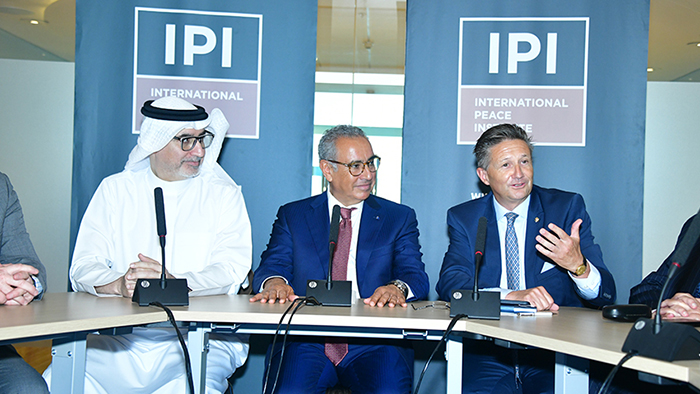
H.E Dr. Mohamed Ali Bahzad, Undersecretary of the Ministry of Foreign Affairs for Consular & Administrative Affairs, Bahrain; IPI MENA Senior Director Nejib Friji; and H.E. Massimo Baggi, Ambassador of Switzerland to the United Arab Emirates and Bahrain
The diplomatic corps, government representatives, academics, private sector and key players convened at IPI MENA to call on regional and global actors to tap into diversity as a tool for unity and a potential solution to address twenty-first century challenges.
On February 27th, IPI MENA hosted H.E. Massimo Baggi, Ambassador of Switzerland to the United Arab Emirates and Bahrain, for an Ambassadorial Series conference under the theme “Diversity and Unity through Federalism” to underline Switzerland’s unique cohesion and the advantages and challenges that arise from it.
H.E Dr. Mohamed Ali Bahzad, Undersecretary of the Ministry of Foreign Affairs for Consular & Administrative Affairs, Bahrain said the commemoration of the 50 years of diplomatic relations between Bahrain and Switzerland is an important landmark in the diverse bilateral ties between the two countries. He said Bahrain looks forward to a stronger partnership with Switzerland. Commending IPI MENA for its Ambassadorial Series initiative, he noted IPI MENA’s role as the heart and disseminator of peace.
Opening the conference, IPI MENA Senior Director Nejib Friji stressed that as a nation with historically diverse populations and influences, the political, social, and economic context of Switzerland must be highlighted to provide an example of possible integration.
“Such diversity typically results in a fractured nation plagued by long-standing issues,” Mr. Friji stated. “As one of the most disintegrated regions in the world, the Middle East and North Africa could benefit from the insights, experience, failures, challenges, and successes of Switzerland.”
Mr. Baggi emphasized that as a direct democracy, power is not concentrated centrally in Switzerland—decision-making does not rest solely with politicians, but with the people.
“A critical component underpinning this process is education,” he stressed. “If you don’t prepare the population, if you don’t educate them, then you run the risk of not making good decisions.”
Pointing to the ways in which federalism can be used for innovation, he noted the generation of creative processes arising from competition between the cantons, and the ameliorating of best practices through health and education sectors in each province.
“Federalism was also the solution for Switzerland to end territorial issues,” he noted, pointing to the violent period of Switzerland’s history in 1815. “Decentralizing helped to find a compromise during a critical period. The objective is not federalism, it is merely an instrument to achieve the objective of peace.”
The conference concluded with an open-floor debate, featuring interventions by the British, German, Korean and Nepalese Ambassadors, as well as Baha’i representatives, members of the Bahrain Businesswomen’s society, journalists, and international lawyer Dr. Fathi Kemicha.
Diplomats from Belgium, Germany, Korea, Morocco, Nepal, Pakistan, Palestine, Switzerland, Tunisia, the United States, United Kingdom, and Yemen, the UN, academics and journalists from Bahrain, private sector, civil society and government representatives from Bahrain’s Foreign Ministry, as well as representatives of various institutions in the MENA region took part in the conference.
Following the conference was an art-workshop presented by Swiss Artist Marta Margnetti, titled “Under A Floorboard,” featuring recyclable materials and incorporating a mnemonic technique in which elements are visualized to create a piece of art that represents “home.”
Artists such as Bahraini Abbas Al Mosawi, Nadia Al Jar and others, participated.







